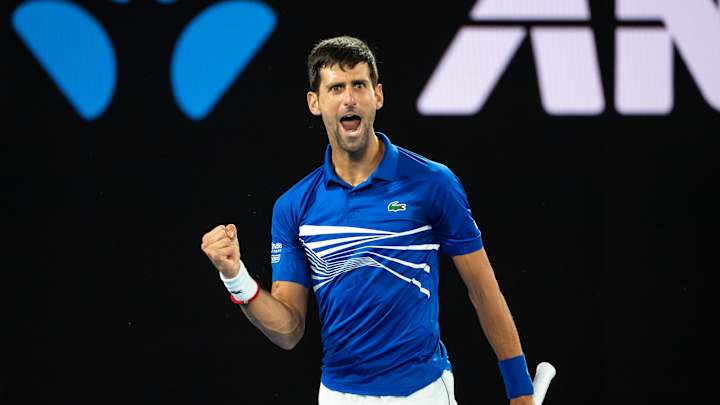Djokovic On Another Level Entirely in Australian Open Beatdown of Nadal

After Rafael Nadal breezed by Stefanos Tsitsipas in the Australian Open semifinals, the stunned 20-year-old described Nadal’s game as a “a different dimension of tennis completely.” Nadal had demolished Tsitsipas in straight sets, just like he had demolished each of his five previous opponents in straight sets. What Tsitsipas likely didn’t envision was Nadal, three days later, looking just as overmatched in the Australian Open final. If Tsitsipas was employing two-dimensional tennis on Thursday, then Novak Djokovic played Sunday’s final in four dimensions.
Djokovic needed just two hours and four minutes to annihilate Nadal, drubbing him 6–2, 6–3, 6–2 to win his seventh Australian Open. Nadal doesn’t lose matches like that, especially after playing such flawless tennis to reach the final—he hadn’t so much as a dropped service game since his opening match. What we expected of the 53rd meeting between Nadal and Djokovic was a reprise of their classic 2012 final, a nearly six-hour slugest between the two best players on the planet. The world’s two best players were indeed on court Sunday, but one showed he’s far better than the other—and everyone else, for that matter.
Djokovic reached a new level on Sunday, confirming not just that he’s the best player in the world, but that he’s playing perhaps the best tennis of his career. His current form rivals even his peak in 2015 and early 2016, one of the most dominant runs in men’s tennis history, when he nearly won the calendar Grand Slam and held all four major titles simultaneously.
WERTHEIM: 50 Parting Thoughts From the 2019 Australian Open
Djokovic controlled every facet of the match from the first toss. Nadal’s serve, upgraded after a motion tweak this offseason, was no match for one of the game’s all-time great returners seeing the ball clearly. Djokovic broke Nadal in his first service game and ultimately won 49% of Nadal’s first-serve points. That is a staggering statistic. Djokovic, meanwhile, won his first 16 points on serve and faced his first and only break opportunity, which he saved, in the third set. He was content to play from the baseline, pelting Nadal with barrages of powerful and precise groundstrokes, but he was just as effective when he came forward, winning 16 of 18 net points. Up two sets, he even deployed a few bizarre, rather unnecessary drop shots—not to toy with Nadal, but just because he could. Like everything Djokovic tried on Sunday, it worked.
Nadal—who, before Sunday, had never lost a Grand Slam final in straight sets—appeared dazed and off–balance, like a boxer trapped helplessly against the ropes. He seemed uncharacteristically nervous and missed several routine shots. Djokovic, meanwhile, was machinelike, smacking winners with ease at impossible angles and rarely ever misfiring. The final count: 21 winners and 28 unforced errors for Nadal; 34 winners and nine unforced errors for Djokovic. Djokovic won 80% of points on his first serve and an astonishing 84% of his second serves, while Nadal won just 51% and 64%. It was as if Nadal was playing on gravel while Djokovic glided on air. “When someone does everything better than you, you can’t complain,” Nadal said after the match.
The result was one of the most lopsided Grand Slam matches ever between members of the Big 3, surpassed only by Nadal’s 6–1, 6–3, 6–0 victory over Roger Federer at Roland Garros in 2008. Less than a year ago, Djokovic fell to Marco Cecchinato in the French Open quarterfinals, extending his slump to two years; since then, he’s won 21 straight Grand Slam matches, including all nine sets of three finals.
JUNG: Naomi Osaka is the New Queen of Tennis
With his 15th major title, Djokovic grabbed sole possession of third place on the all-time list, passing Pete Sampras. He now trails only Federer (20) and Nadal (17). Passing Federer once seemed achievable, before the slump made it unrealistic; now it again feels possible, if not probable. Even considering that deficit, Djokovic already has a case as the greatest ever: He’s the only male player to win all nine Masters titles, and he’s won 15 majors and 73 career titles despite competing his entire career against two other GOAT candidates. If he wins the French Open—Nadal remains the favorite, but Djokovic’s prospects suddenly look a lot rosier—he’ll hold all four major titles simultaneously for the second time, something Nadal and Federer never accomplished even once.
It’s easy to overreact to one exceptional performance. Though Djokovic played his best tennis on Sunday, he hardly looked indomitable just a few days ago against Daniil Medvedev, hitting 50 unforced errors in that match alone. Tennis fortunes can turn quickly, as Djokovic should know better than anyone. But his Australian Open triumph suggests that what once looked impossible—holding all four majors at once for a second time, winning the calendar Grand Slam, making a serious case as the GOAT—now seems plausible. As Nadal discovered on Sunday, the only player capable of stopping Novak Djokovic right now is Novak Djokovic.
